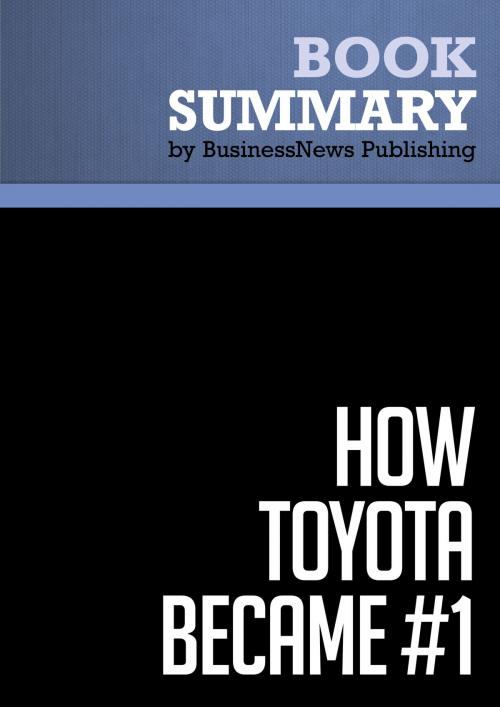Summary: How Toyota Became #1 - David Magee
Business & Finance, Economics, Development & Growth, Management & Leadership, Management| Author: | BusinessNews Publishing | ISBN: | 9782806247025 |
| Publisher: | Must Read Summaries | Publication: | February 15, 2013 |
| Imprint: | Business Book Summaries | Language: | English |
| Author: | BusinessNews Publishing |
| ISBN: | 9782806247025 |
| Publisher: | Must Read Summaries |
| Publication: | February 15, 2013 |
| Imprint: | Business Book Summaries |
| Language: | English |
This work offers a summary of the book “HOW TOYOTA BECAME #1: Leadership Lessons from the World’s Greatest Car Company” by David Magee.
“I was surprised,” writes David Magee, “at what I found as I interviewed key managers at Toyota. Despite the company’s incredibly successful, even meteoric rise, it was nearly impossible to get anyone inside the company to talk about the numbers. The criteria and qualities leading to Toyota’s rise to the top had little to do with sales results or profit margins.”
Magee has analyzed how Toyota has created such a successful corporate environment, and how others can emulate them. Toyota looks at new products from the perspective of what customers want, rather than what they have capability to make; managers have empowered even bottom-level employees to act for themselves. Factual information is treated as autocratic: it doesn’t matter whether those facts come from senior management or lower down. Toyota is famous for having a production line that can be halted by anyone, because everyone is responsible for quality control. Executives don’t have special parking spots, they are expected to work longer hours, and they walk the manufacturing floor regularly.
Toyota’s philosophy is based on mutual respect of all employees, and the willingness to prioritize the customer over procedural convenience. It’s possible, no matter the market, for others to do the same.
“I was surprised,” writes David Magee, “at what I found as I interviewed key managers at Toyota. Despite the company’s incredibly successful, even meteoric rise, it was nearly impossible to get anyone inside the company to talk about the numbers. The criteria and qualities leading to Toyota’s rise to the top had little to do with sales results or profit margins.”
Magee has analyzed how Toyota has created such a successful corporate environment, and how others can emulate them. Toyota looks at new products from the perspective of what customers want, rather than what they have capability to make; managers have empowered even bottom-level employees to act for themselves. Factual information is treated as autocratic: it doesn’t matter whether those facts come from senior management or lower down. Toyota is famous for having a production line that can be halted by anyone, because everyone is responsible for quality control. Executives don’t have special parking spots, they are expected to work longer hours, and they walk the manufacturing floor regularly.
Toyota’s philosophy is based on mutual respect of all employees, and the willingness to prioritize the customer over procedural convenience. It’s possible, no matter the market, for others to do the same.
This work offers a summary of the book “HOW TOYOTA BECAME #1: Leadership Lessons from the World’s Greatest Car Company” by David Magee.
“I was surprised,” writes David Magee, “at what I found as I interviewed key managers at Toyota. Despite the company’s incredibly successful, even meteoric rise, it was nearly impossible to get anyone inside the company to talk about the numbers. The criteria and qualities leading to Toyota’s rise to the top had little to do with sales results or profit margins.”
Magee has analyzed how Toyota has created such a successful corporate environment, and how others can emulate them. Toyota looks at new products from the perspective of what customers want, rather than what they have capability to make; managers have empowered even bottom-level employees to act for themselves. Factual information is treated as autocratic: it doesn’t matter whether those facts come from senior management or lower down. Toyota is famous for having a production line that can be halted by anyone, because everyone is responsible for quality control. Executives don’t have special parking spots, they are expected to work longer hours, and they walk the manufacturing floor regularly.
Toyota’s philosophy is based on mutual respect of all employees, and the willingness to prioritize the customer over procedural convenience. It’s possible, no matter the market, for others to do the same.
“I was surprised,” writes David Magee, “at what I found as I interviewed key managers at Toyota. Despite the company’s incredibly successful, even meteoric rise, it was nearly impossible to get anyone inside the company to talk about the numbers. The criteria and qualities leading to Toyota’s rise to the top had little to do with sales results or profit margins.”
Magee has analyzed how Toyota has created such a successful corporate environment, and how others can emulate them. Toyota looks at new products from the perspective of what customers want, rather than what they have capability to make; managers have empowered even bottom-level employees to act for themselves. Factual information is treated as autocratic: it doesn’t matter whether those facts come from senior management or lower down. Toyota is famous for having a production line that can be halted by anyone, because everyone is responsible for quality control. Executives don’t have special parking spots, they are expected to work longer hours, and they walk the manufacturing floor regularly.
Toyota’s philosophy is based on mutual respect of all employees, and the willingness to prioritize the customer over procedural convenience. It’s possible, no matter the market, for others to do the same.















